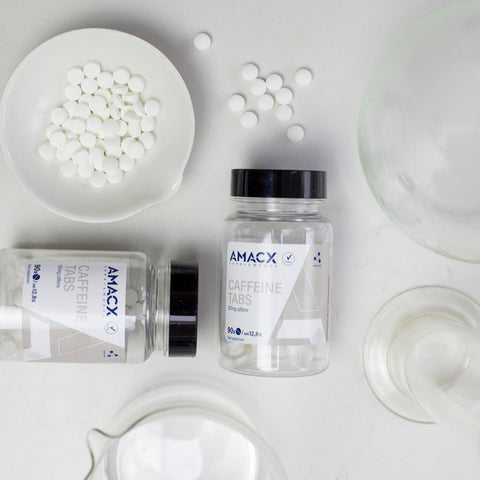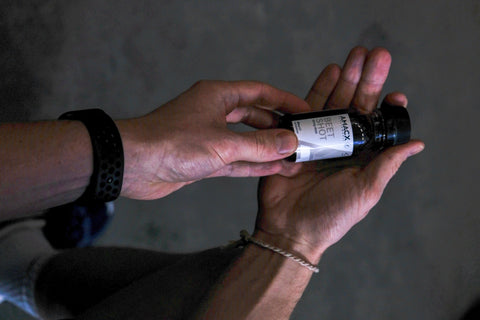Only really wake up after a cup of coffee? Or overcome the afternoon dip with a can of energy drink? That caffeine can affect our energy levels is no secret. In fact, the vast majority of the Netherlands consumes one or more products containing caffeine on a daily basis. This makes it without a doubt the most well-known, cheapest and easily available performance-enhancing drug. How exactly this works, and how you can actually use this substance to your advantage, you will read in this blog.
Summary:
- Caffeine is one of the best known and most researched performance-enhancing supplements in sports. Its proper intake increases alertness, focus and pain threshold and thus can provide performance benefits in a wide variety of sports.
- The optimal dosage varies from person to person and lies somewhere between 1 to 2 and 5mg per kg of body weight. To find an individual optimum, caffeine intake should be practiced regularly in training.
- About 45 to 60 minutes after intake of a caffeine-containing product, the substance is absorbed into the blood and one can experience the performance-enhancing effects.
- There are several drawbacks to regular caffeine-containing foods to properly meet the intended intake. For example, the exact caffeine content may be unknown, or other ingredients may cause stomach or intestinal discomfort. Energy gels or a pill/capsule containing caffeine is therefore the best choice in many cases.
About the effect of Caffeine
Caffeine, after being absorbed into the body, stimulates the central nervous system. It does this by preventing the substance adenosine from doing its job. In doing so, it stimulates alertness and focus, for example, and temporarily increases pain threshold. Moreover, there is scientific evidence that caffeine can play a positive role in making muscles contract more efficiently. Its positive effects on athletic performance were discovered and extensively researched in the 1980s and 1990s. This research shows performance-enhancing effects in a wide range of sports: endurance efforts can be sustained longer, time trials are completed faster, but short maximal efforts such as in strength or team sports also improve. For this reason, caffeine was on the doping list until 2004, but since then the use of this performance-enhancing drug has been completely legal.
Dosage and timing
However, it takes more than simply drinking a cup of coffee or taking a can of energy drink shortly before a race. In fact, the right dosage and timing of intake are crucial to achieve the right effects. Starting with the optimal dosage: this varies from person to person; in fact, how sensitive we are to the effects of caffeine is genetically determined. The performance-enhancing range thus runs from +- 1 or 2 to 5mg per kg of body weight.
In other words, from 100 to 350mg for a 70kg person. However, you can easily find your individual optimal dosage by testing the use of caffeine in workouts. Start lower in the range, and gradually increase to a higher dosage until you experience the above effects optimally. Please note that a higher dose is not always better: too high a dose can make you feel restless or rushed. In addition, always remember that caffeine can have a negative effect on sleep duration and quality. Some people are more sensitive to this than others, but reduced sleep inevitably results in reduced recovery and reduced performance the day after. Especially during multi-day sports events with a race/finish late in the day, it is therefore important to make the right trade-off between optimal performance or optimal sleep.
From coffee to energy gels and pills
To get to your optimal dosage, there are several products you could take. A cup of coffee will undoubtedly be the best known form of this. Besides the fact that in many situations it is not practical to drink coffee (especially during exercise), the caffeine content in a cup of coffee varies enormously. This is due, for example, to differences in bean types, while the grind and preparation also have a great influence on this. On average, a cup of coffee contains about 50 to 60mg of caffeine, but peaks well above 100mg are no exception. This makes it impossible to rely on a cup of coffee to carry out your competition protocol in detail. Much better, therefore, to opt for an energy gel with caffeine and/or a caffeine pill. The former has the advantage of being easy to fit into a race nutrition plan. However, this can also be a disadvantage in another situation: should you aim for a relatively high caffeine intake, you won't be able to achieve that via gels alone without ingesting too many carbohydrates. In such a case, a caffeine pill might be a better choice (or supplement). Examples of caffeine levels for a number of products can be found in the table below.
|
Product |
Caffeine |
Timing |
Advantages |
Disadvantages |
|
Coffee |
40-200 mg |
45-60 min |
- |
- Difficult to dose - Difficult to use during exercise |
|
Energy drink |
80-200 mg |
45-60 min |
- |
- Difficult to use before/during exercise - Contains undesirable additives that increase risk of gastrointestinal distress |
|
Energy gel |
50-75 mg |
45-60 min |
- Delivers energy and caffeine at the same time - Precise dosing |
- Harder to achieve higher doses |
|
Pil or capsule |
100-200 mg |
45-60 min |
- Easy to take - Higher doses easily possible |
- Difficult to dose accurately - Greater chance of complaints |
|
Chewing gum |
50-80 mg |
15-20 min |
- Very fast action - Precise dosing |
- More difficult to achieve higher doses
|
What is the ideal Caffeine intake?
While the dosage may vary from person to person, the optimal timing of intake is always the same. Whether you take a cup of coffee, an energy gel with caffeine or a caffeine pill: absorption through the gastrointestinal tract into the blood takes about 45 to 60 minutes. Therefore, make sure you take your caffeine-containing product a little over an hour prior to the race (or its finals). The only exception to this is a caffeine-containing chewing gum: its absorption takes place directly in the mucous membranes in the mouth, so the effect can be experienced within as little as 10 minutes. The half-life of caffeine is about 5 hours, meaning that 5 hours after ingestion, half of the dosage taken is still present in the blood.











